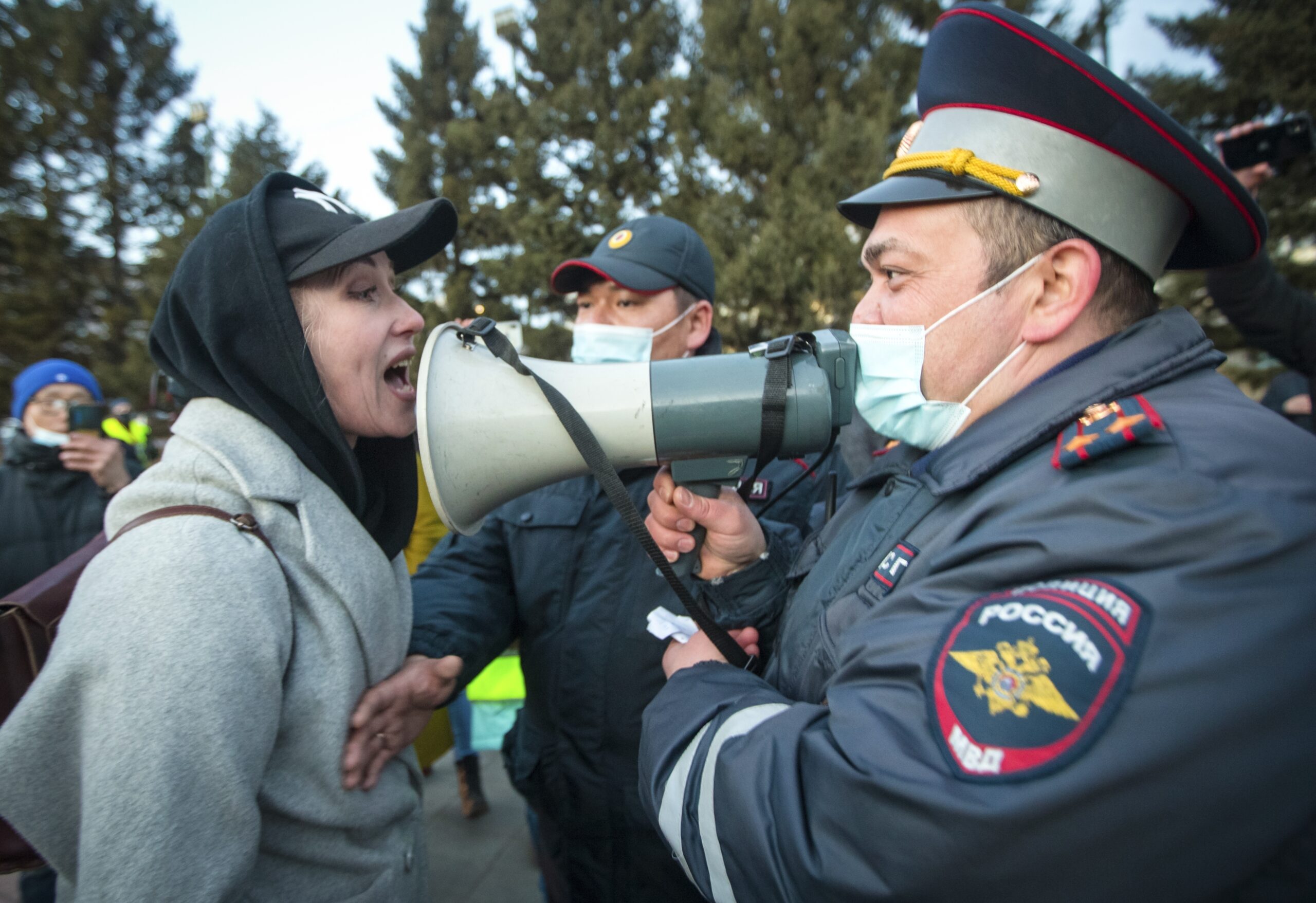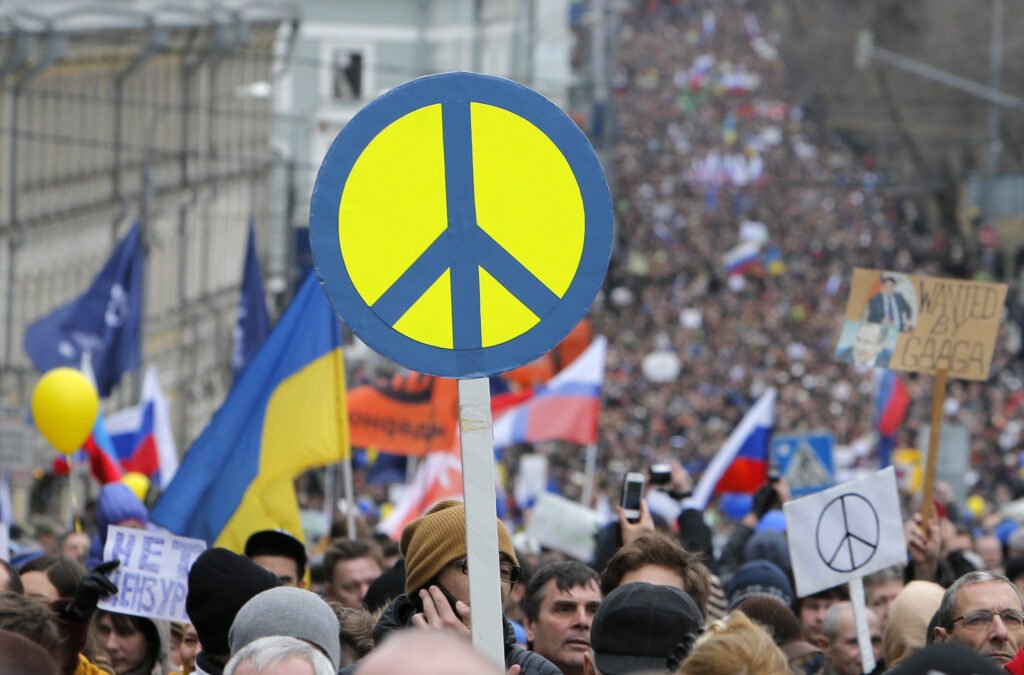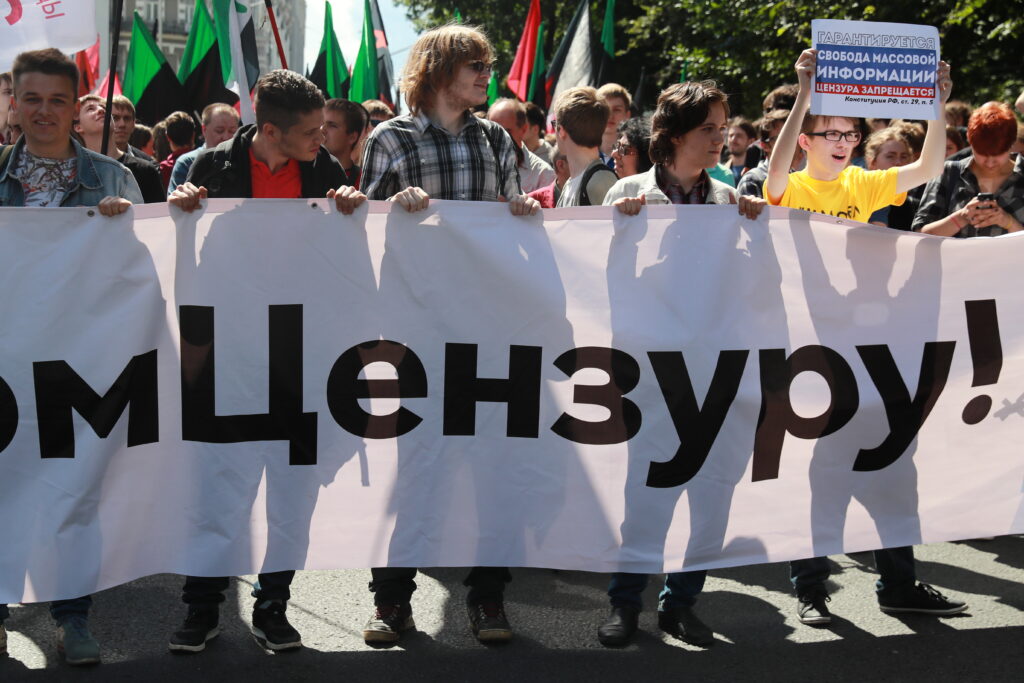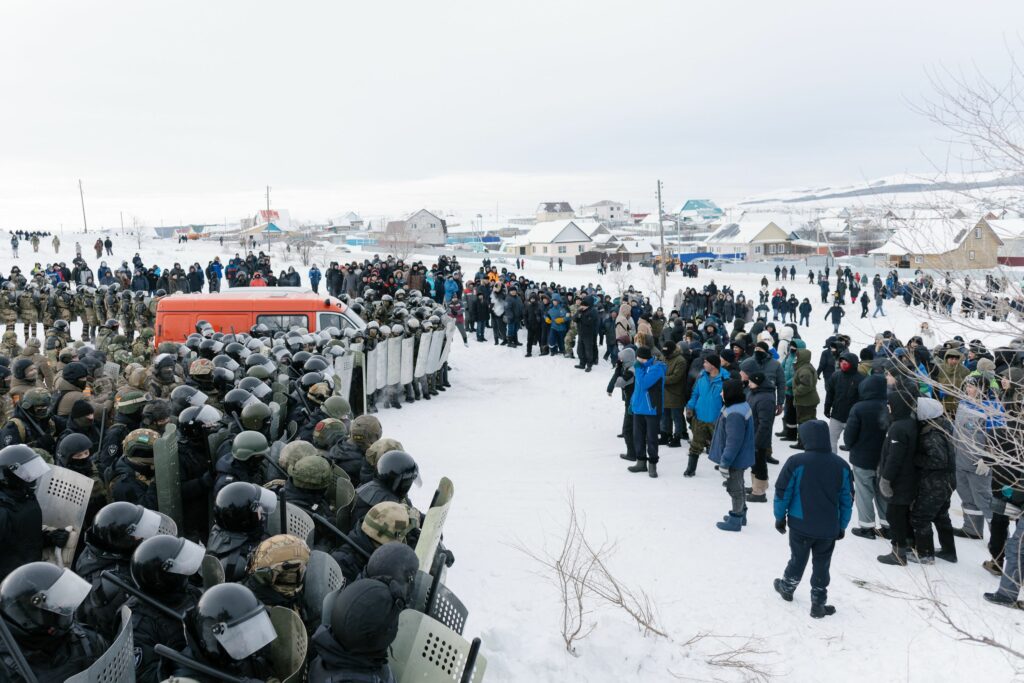As the guarantor of the Constitution, the Russian President is responsible for maintaining civil peace and harmony. However, since the 2011−2012 protests, Putin has effectively unleashed a cold civil war inside the country, polarising Russian society and labelling all those who disagree with him as ‘traitors’. He had resorted to the ‘divide and rule’ strategy before. One well-known example is the statement he made in the autumn of 2007 about people begging for scraps at foreign embassies. However, ten years ago this polarising rhetoric became an integral part of the narrative disseminated by the government’s propaganda. At present, the society is more divided than ever between the supporters of the regime and the opposition: the two camps have nothing in common at all. And this is a bad signal for Russia’s future.
Divide and rule
Samuel Greene of King’s College London and Graeme Robertson of the University of North Carolina at Chapel Hill write that since the 2011−2012 protests, the Kremlin has employed the tactics of wedge issues. While not central to the political agenda, wedge issues are emotionally charged and powerful because they address sensitive topics. While widely publicised, they can divide people, even those who agree with one another on matters of principle. This tactic was chosen deliberately by the authorities in order to prevent the emergence of an anti-Putin consensus that would unite the opposition and people formerly loyal to the regime who are dissatisfied with the irremovability of the authorities.
When selecting wedge issues, the Kremlin opted for religion and homosexuality. It unwound the former through the Pussy Riot case in 2012. By defending the artists who performed a punk prayer «Virgin Mary, chase Putin away!» in Christ the Saviour Cathedral in Moscow, the opposition turned out to be vulnerable to normative criticism from a religious perspective: «How can you defend those who insulted the church?» The time for homosexuality came in 2013. In the summer of that year, the Duma passed a law banning the ‘propaganda’ of same-sex sexual relations among minors. The same law also bans ‘gay propaganda’. Criticism of this law immediately made anyone a convenient target for the public media, who paint the world picture for the average conservative Russian citizen: «Are you against the gay propaganda law? Oh, well, then you’re one of them.»
The Putin regime framed both the defence of religious Orthodoxy and the fight against homosexuality through a narrative in defence of traditional Russian values, i.e. ‘spiritual bonds’, against the values of the liberal West. As Indiana University professor Regina Smyth notes, since the annexation of Crimea in 2014, the anti-Western narrative has become a key driver of Russian domestic politics. Anything the Kremlin disliked was forcibly labelled as ‘foreign’. And anything foreign is hostile by default.
Foreign agents
Back in the summer of 2012, the Duma adopted amendments to the law on non-profit organisations, which allowed the authorities to label Russian NGOs as ‘foreign agents’. Only one organisation was included in the register of foreign agents until July 2014 but since mid-2014 the register has been regularly updated with new entries being added. Moreover, three new registers have been operating in Russia since that time. Alongside the register of NGOs who are foreign agents, the register of foreign media was established in 2017. And in 2020, registers for non-registered public associations and individuals were created. Today, a whole range of civil society members have been declared as foreign agents in Russia: independent media, human rights organisations, cultural, environmental, educational, scientific and political organisations, as well as journalists, politicians, human rights defenders, researchers and activists.
The culmination of Putin’s divide-and-rule policy should come with the law «On monitoring the activities of persons under foreign influence.» Once it has been passed and enters into force-of which there is no doubt-the Kremlin will be in a position to designate anyone as a foreign agent as it sees fit. While the previous practice of labelling people or organisations as foreign agents required, along with ‘political activity’ or dissemination of information, the existence of foreign funding (which, in fact, was easily detected even if it did not exist), this condition is not required under the new law. It is sufficient to be under ‘foreign influence’ and, for example, to run a page on a social network. Not surprisingly, ‘foreign influence’ is defined in a way that makes this label suitable for pretty much anything.
Considering the connotations around the term ‘foreign agent’ in Russian, namely a foreign spy, a traitor, it would not be an exaggeration to call the new initiative a law on ‘enemies of the people’. The purpose is to introduce the practice of stigmatising prominent representatives of civil society, which has already been tried and tested by the Russian authorities, to create additional incentives for self-censorship and to reinforce the atmosphere of distrust, fear and hostility in society.
The same views on the enforcement of the foreign agents legislation and its impact on society have been previously expressed by the Venice Commission experts and the authors of the OVD-Info report. In mid-June, even the ECtHR recognised the Russian legislation on foreign agents as a violation of human rights. Presidential spokesman Dmitry Peskov, however, rushed to state that the Kremlin is no longer obligated to obey the ECHR’s decisions since Russia had withdrawn from the Council of Europe.
What’s the outcome?
Wedge issues, together with anti-Westernism and foreign-agent-labelling initiatives, have done their job by widening the divide between the pro-Putin majority and the opposition. Anton Shirikov of the University of Wisconsin-Madison, who conducted a series of surveys among Russians in August 2019 and May-June 2020, found that Russian society is split along the line of ‘regime supporters’ versus ‘opposition’. The former systematically distrust any information that is critical of the regime, while the latter tend to disbelieve any information that positively views the work of the government. As a result, people are sinking deeper and deeper into their ‘echo chambers’, which only aggravates the polarisation.
Philipp Chapkovski of the Berlin Social Science Center and Alexei Zakharov of the University of Chicago conducted an online experiment among supporters and opponents of the war in Ukraine. The authors recruited two thousand people and paired them up so that in half of the cases a supporter of the war was paired with an opponent. Under the terms of the experiment, supporters of the war played the role of ‘dictators’ and could either share a small amount of money with their partner or keep it for themselves. The researchers found that the issue of support for war was connected with affective polarization: pro-war respondents systematically exhibited non-cooperative behaviour towards opponents of military aggression, and were less likely to share money with them than with people who adhered to the same views.
Journalist Andrej Loshak’s documentary «Breaking the Ties» shows how the emotional polarisation over Russia’s invasion of Ukraine creates insurmountable rifts within families. The Kholod magazine wrote about this very topic at the beginning of the war.
In fact, there is nothing surprising in these observations. As research has shown, differences in attitudes significantly affect people’s social circle, their preferred place of living, networking choices and how much time they spend with families. Moreover, emotional polarisation undermines interpersonal trust, making society less manageable. According to the World Values Survey, only 23% of Russians believe that most people can be trusted — this the lowest level of trust in this country since the 1990s.
Why does Putin need polarisation?
Since the invasion of Ukraine, the Kremlin has deliberately broadened the watershed between supporters and opponents of his regime, turning the contradictions between them into existential issues. In Putin’s own words, all those who oppose the war are ‘traitors of the nation’ with a slave-like mind, the ‘fifth column’, ‘scum’ and ‘gnats in the mouth’ that the Russian people will ‘spit out on the panel’. Former President Medvedev said that criticism of the Russian authorities during the war in Ukraine was a ‘betrayal’. Duma Speaker Volodin suggested that Russians who criticise the war should be stripped of their citizenship.
An openly anti-war stance in Russia is a sure source of problems with the state. The mass media are being blocked and shut down, teachers and professors are fired, students expelled, politicians and MPs put in pre-trial detention, musicians’ concerts cancelled, comedians threatened, public figures declared to be foreign agents. Criminal cases and arrests for anti-war stances, blocked social media, military censorship and denunciations — all these are elements of the current internal politics in Putin’s Russia right now.
In a recent study, Samuel Greene and Graeme Robertson conclude that the Russian authoritarian regime does not rest on citizens’ faith in political institutions and certainly not on people’s trust in each other, but rather on the emotional component, linking their present, future and even past to Putin. The presence of internal and external enemies seeking to destroy the country is among the main elements of the propaganda narrative portraying Putin as an indispensable figure for the country: «No Putin, no Russia».
What next?
In 2014, Putin unleashed a war in eastern Ukraine, launching a full-scale invasion in 2022. However, he had started a cold war against Russians even earlier. Both wars look hopeless. Putin will not win the war against Ukraine, even though he has sacrificed the economic and personal well-being of millions of Russians on its altar: the West will not allow it, and Russia has and will have no influential allies. As for the cold war he unleashed against Russian citizens, its consequences will be felt by the society for years: low interpersonal trust, low legitimacy of the political system and, as an outcome, low likelihood of a peaceful resolution of internal conflicts.










